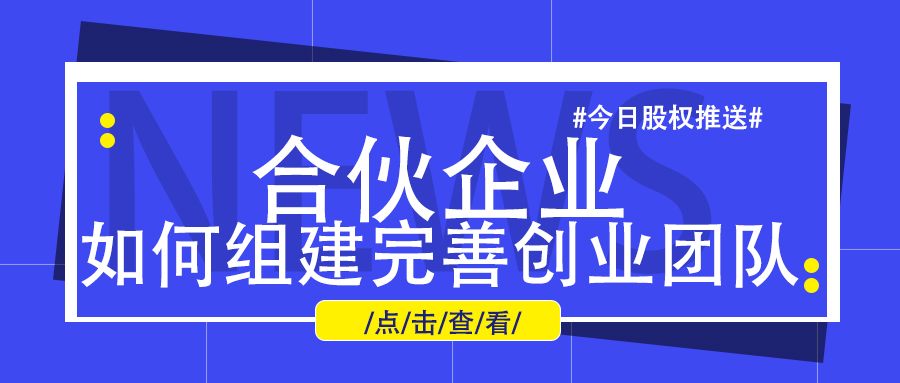
一股独大,利益共享的主体公司的设置要点
发布时间:2024-01-28 来源:http://www.lushangyun.com/
股权激励的本意是通过激励机制,使得企业老板与员工共同分享企业发展的成果,同时让大家成为企业的主人,调动员工积极性和提开员工归属感。但股权激励绝不意味着“股散人散”,事实上任何一个公司如果股权太过干分散,进人资本市场以后企业的控制权必然会产生隐患,从而对企业经营造成恶劣的影响。因此在进行股权激励时,不仅要考虑目的性与激励性,企业的控制权一样需要在方案刚开始设计时就设计好架构。公司需规定拿出多少用于员工微励,多少用于日后预留,以及需要多少股份作为控股公司增强企业的控制权。
The original intention of equity incentives is to use incentive mechanisms to enable business owners and employees to share the achievements of enterprise development, while also making everyone the masters of the enterprise, mobilizing employee enthusiasm and enhancing employee sense of belonging. However, equity incentives do not necessarily mean "scattered stocks and scattered individuals". In fact, if any company's equity is too dry and scattered, entering the capital market will inevitably create hidden dangers in the control of the enterprise, thereby causing adverse effects on the operation of the enterprise. Therefore, when conducting equity incentives, not only should the purpose and incentive be considered, but the control rights of the enterprise also need to be well structured at the beginning of the plan design. The company needs to specify how much to allocate for employee incentives, how much to reserve for future use, and how many shares are needed as a holding company to enhance control of the enterprise.
根据我们多年的经验,好的股权激励方案应”一股独大,利益共享”,即以控股机制为基础,以资本运作为导向。激发员工内部创业和创富的潜力。总的来说,在股权布局中,要考虑好主体公司,控股公司、持股公司、分/子公司的架构设计问题。
Based on our years of experience, a good equity incentive plan should be based on a controlling mechanism and guided by capital operations, with one shareholder dominating and sharing benefits. Stimulate the potential for internal entrepreneurship and wealth creation among employees. Overall, in equity layout, it is necessary to consider the structural design issues of the main company, holding company, holding company, and branch/subsidiary companies.
主体公司
Subject company
在设立主体公司及划分业务层级时,既要考虑盈利又要考虑长期性。因此,可以将公司的业务分为基础业务、发展业务和机会业务。
When establishing the main company and dividing business levels, both profitability and long-term sustainability should be considered. Therefore, the company's business can be divided into basic business, development business, and opportunity business.

主体公司的实质是企业的未来上市主体与业务经营主体。拥有一个业务良好的主体公司,将相关业务吸收到主体中,不仅可以有效发挥集团的协同效应,而且IPO后更容易受到资本市场的青睐。因此,,我们在考虑主体公可时,除了一些资质、税收、优惠政策之外,主体公司的业务情况也是需要考虑的因素之一。
The essence of the main company is the future listing entity and business operation entity of the enterprise. Having a well performing entity company that incorporates relevant business into the entity can not only effectively leverage the synergies of the group, but also make it more likely to be favored by the capital market after an IPO. Therefore, when considering the subject company, in addition to some qualifications, taxes, and preferential policies, the business situation of the subject company is also one of the factors that need to be considered.
此外,企业在上市后,还经常涉及主体公司进行一部分股权收购和资产收购的问题,这里的主体和客体在法律和经济层面上也会存在诸多差异。
In addition, after a company goes public, it often involves the acquisition of some equity and assets by the main company, and there are also many differences in the legal and economic aspects between the subject and object.
1》主体和客体不同
1》 Subject and object are different
股权收购的主体是收购公司和目标公司的股东,客体是月标公司的股权,资产收购的主体是收购公司和目标公司,客体是控股公司的资产
The subject of equity acquisition is the shareholders of the acquiring company and the target company, the object is the equity of the monthly target company, the subject of asset acquisition is the acquiring company and the target company, and the object is the assets of the holding company
2)者的负债风险不同
2) The debt risk of individuals varies
股权收购后,收购公司成为目标公司控股股东。收购公司仅在出资范围承担责任,目标公司的原有债务由目标公司承担,但因为目标公司的原有债务对今后股东的收益有着巨大的影响,因此在股权收购前,收购公司必须调查清楚目标公司的债务状况。在收购时往往难以预料目标公司的债务状况,因此,股权收购存在一定的负债风险。而在资产收购中,资产的债权、债务情况一般比较清晰,除了一些法定责任外,如环境保护,职工安置,基本不存在或存有负债的问题。因此,资产收购关注的是资产本身的债权、债务情况。
After the equity acquisition, the acquiring company becomes the controlling shareholder of the target company. The acquiring company only bears responsibility within the scope of capital contribution, and the original debt of the target company is borne by the target company. However, because the original debt of the target company has a huge impact on the future earnings of shareholders, the acquiring company must investigate the target company's debt situation before equity acquisition. It is often difficult to predict the target company's debt situation during acquisitions, therefore, equity acquisitions carry certain debt risks. In asset acquisition, the creditor's rights and debt situation of assets are generally clear, and apart from some legal responsibilities such as environmental protection and employee resettlement, there are basically no or existing debt issues. Therefore, asset acquisition focuses on the creditor's rights and debt situation of the asset itself.
3)两者还存在税收方面的差异
3) There are still tax differences between the two
在股权收购中,纳税义务人是收购公司和目标公司的股东,与目标公司无关。除了合同印花税外,根据《关于企业股权投资业务若干所得税问题的通知》的规定,目标公司股东可能因股权转让所得缴纳所得税。在资产收购中,如果纳税义务人是收购公司和目标公司,还需缴纳增值税。
In equity acquisitions, taxpayers are shareholders of both the acquiring company and the target company, and are not related to the target company. In addition to contract stamp duty, according to the Notice on Several Income Tax Issues Concerning Enterprise Equity Investment Business, shareholders of the target company may pay income tax on income from equity transfer. In asset acquisition, if the taxpayer is the acquiring company and the target company, value-added tax is also required to be paid.
本站声明
本网站为非营利性网站,旨在宣扬股权知识,交流职业学习心得。网站内部分文章来自其它网站,只做交流学习之用。相应的权力均属于原权 力人,如权利人认为不妥,请来电来函说明,本网站随既停止或使用,谢谢合作! 13698613138
13698613138
微信公众号

扫码获知更多知识

抖音二维码

截屏,微信识别二维码